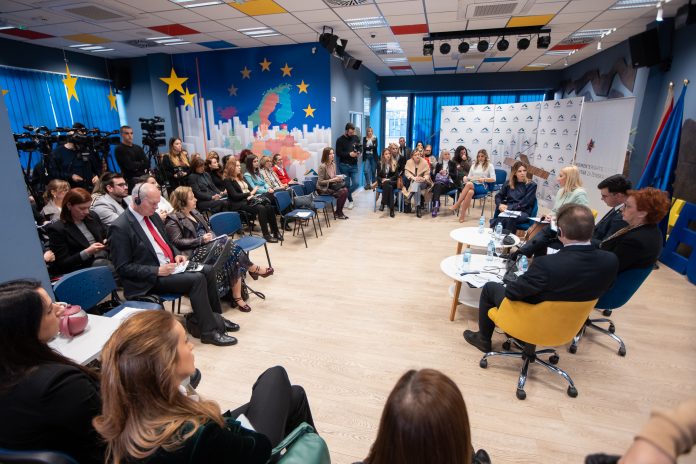At the panel “Gender equality in focus: Analysis of the European Commission Report”, the Center for Women’s Rights presented recommendations for the improvement of gender equality and the fight against gender-based and family violence, in the process of European integration. The guidelines, intended for state institutions, are the result of the Gender Analysis of the EC Report on Montenegro 2023, which was implemented by the Center for Women’s Rights with the financial support of the European Union and the Ministry of European Affairs through the EU4ME project.
Speakers on the panel, moderated by Maja Raičević, Executive Director of the Center for Women’s Rights, were: the Minister of European Affairs Maida Gorčević, Minister of the Interior Danilo Šaranović, Vice President of the Parliament Zdenka Popović and German Ambassador Peter Felten.
Minister Gorčević pointed out that, although there is progress in this area, numerous laws and the National Strategy, it is not enough to solve the challenges we are confronting.
“We don’t want to be declarative. We want to be realistic in achieving the set goals,” Gorčević said.
She expressed the expectation that the political will and stability that currently exists in Montenegro will unblock things on the ground when it comes to equality and human rights and announced that the Ministry of European Affairs will launch a wider dialogue with non-governmental organizations in February, among other things, in connection with issues gender equality.
“We have shown that we are a reliable partner of the EU and that we are doing our best to implement everything we proclaimed and promised. Our focus in the forthcoming period will be on chapters 23 and 24, i.e. the Rule of law. In this direction, we expect the establishment of the Council for the Rule of Law as soon as possible, including representatives of the NGO sector,” said the minister.
Minister Šaranović said that the Ministry of Internal Affairs continuously, following the recommendations received from the European Commission and international partners, is committed to strengthening capacity, in terms of training and professionalizing police officers to work on suppressing cases of gender-based and domestic violence. In addition to improving personnel capacities, they also worked on improving the conditions for accommodating victims.
“I would like to remind you that several years ago the Ministry formed an Operational Team for the fight against domestic violence and violence against women, and the plan is to form a team at the level of the Government, which would strengthen the mandate of this body,” said Minister Šaranović.
The Vice-President of the Parliament Zdenka Popović indicated the fact that gender equality is one of the main criteria for closing Chapter 23 and that we must deal with that issue with particular attention. She said that the European Commission rightly points to the significance of this area and to concrete measures to ensure that women who want to be involved in politics are well represented and have adequate representation of women in politics.
“There are many women in the public life of Montenegro who are more educated, professional, and capable than men. What prevents them from better positioning themselves politically is hate speech and gender-based violence, and these are things that we must regulate and find a way to prevent hate speech on portals,” said Popović.
She shared her experience in participating in the negotiations on the formation of the 44th Government, emphasizing that she was the only woman who, along with ten men, participated in those negotiations.
“It is important that our voice is heard, that we are taken seriously, more seriously than before. In the new parliamentary convocation, we have 22 female parliamentarians. For the first time, we have three women in the collegium of the President of the Parliament. We also have three women in the Security and Defense Committee, but we don’t have enough female chairpersons of the committee,” said Popović.
Ambassador Felten explained that gender equality is a cross-sectoral issue. “You will find it in many chapters of the recent EU Report on the progress of Montenegro. Therefore, including women’s rights, resources, and representation in all policies is a way to comprehensively promote gender equality. Addressing violence against women, including domestic violence; fight against hate speech and misogyny; strengthening the representation of women in political and economic life; promoting equal rights, human dignity, and respect and appreciation of diversity as the cornerstone of school education based on values – these are fundamental elements on the way to gender equality and a society without discrimination”, said the German ambassador.
During the presentation of the Analysis, Raičević emphasized four central guidelines. The first thing she stated was the urgent appointment of a Government working team that will analyze the existing, she stated, ineffective system for the protection and support of victims, ensure continuous supervision and assessment of the work of competent institutions, and establish a program for the reintegration of victims of violence.
It is also necessary to harmonize the legal framework with international standards for protection against discrimination and gender-based violence and implement binding recommendations of international bodies (CEDAW, UPR, GREVIO), organize training and strengthen the capacities of competent institutions for recognizing violence and gender discrimination in the field of work and employment.
As a third recommendation, Raičević mentioned changes to the electoral legislation, which would increase the political participation of women and prescribe a clear and effective mechanism of sanctions in case of non-compliance with quotas. It is also necessary to improve the legislative and institutional framework, which regulates cooperation between the state and civil society, especially the Law on NGOs.
The center announced that it will formally submit a set of recommendations for the improvement of gender equality in the process of European integration and monitor their implementation within the competent state institutions.







